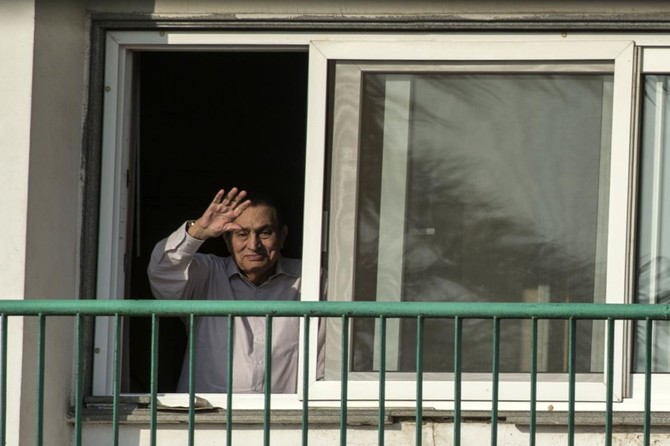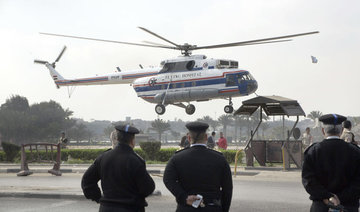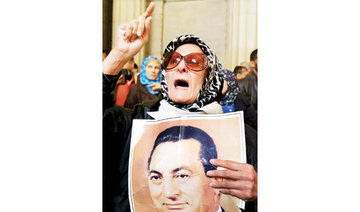CAIRO: In six years, Egypt’s Hosni Mubarak has gone from symbolizing the hubris of Middle East dictators swept away by the Arab Spring uprisings to an emblem of dashed hopes.
The strongman who ruled for 30 years had warned that if it were not for him chaos would grip Egypt.
To the dismay of protesters who put their faith in the revolution, Mubarak left a military hospital on Friday where he had been detained since his 2011 ouster to a country where many now remember his stable rule with nostalgia.
Mubarak had remained defiant since his ouster, sneering at the movement that in a mere 18 days in January and February 2011 shook the foundations of the venal police state he sculpted over three decades.
Months after he was forced from power, Mubarak was placed on trial for his role in trying to quash the protests that led to his overthrow, and in which some 850 people were killed.
Wheeled in to court on a gurney, wearing his trademark sunglasses and looking disgusted, Mubarak denied the charges. He was later sentenced to life in prison.
“When I heard the first verdict I laughed. I said: ‘Ha!,’” he told a private broadcaster after the sentencing. “I did nothing wrong at all,” he said.
Apparently referring to economic growth, he said: “The last 10 years showed more results than the 20 years before, including telephones and so on, and then they turned against us.”
At a retrial, the court decided to drop the main charges against Mubarak on a technicality.
He beat other cases too, but was sentenced to three years for corruption, which took into account time served.
This month, after a final acquittal in the protester killing case, the prosecution said he was free to go.
A few protesters who supported the strongman would show up at his trials. Their slogan: “We are sorry president.” Many laughed at them.
But over the years the sentiment grew as Egypt tottered from one disaster to another while hard-liners who came to power contested its levers with the military and police.
The hard-liners Mubarak had warned about, in the form of his successor Mohammed Mursi, greatly divided the country.
Millions took to the streets in June 2013 demanding the Muslim Brotherhood politician’s resignation just a year after his election, prompting the army to oust and detain him.
Police killed hundreds of Mursi’s supporters in clashes at protests while extremists launched an insurgency that has since killed hundreds of soldiers and policemen.
Many Egyptians began to yearn for the banality of Mubarak’s era, while activists who spearheaded his ouster found themselves in jail.
Mubarak was the fourth president of the Arab Republic of Egypt, founded in 1952 when the military overthrew the monarchy.
He was neither an inspirational revolutionary like Gamal Abdel Nasser, nor a charismatic and daring politician like Anwar Sadat, whom he served as vice president before Sadat’s assassination in 1981 by radicals.
Born on May 4, 1928 in the Nile Delta village of Kafr Al-Meselha, Mubarak rose through the ranks of the air force before becoming vice president.
A bland politician, he inspired little veneration, instead earning the moniker “The Laughing Cow” after the mascot of a processed cheese brand. As his reign stretched on, he became known to the opposition as “The Pharaoh.”
But he did prove to be an adept politician, picking up where Sadat had left off.
He maintained a peace treaty with Israel — the reason Sadat was assassinated — and became a main player in the US-sponsored Israeli-Palestinian peace process more than a decade later.
Even as Egypt’s population boomed during the Mubarak era, the Arab world’s most populous country — also its one-time intellectual and cultural core — faded as a regional power.
Both governance and the economy were greased by patronage and corruption. Mediocrity, half measures and rights abuses were the hallmarks of his rule.
During the 2000s, change came to Egypt. Slowly, under the direction of his unpopular son Gamal, the government began a program of economic liberalization.
At the same time, and largely in response to US pressure, Mubarak began to ease his grasp of political life.
“Let them have fun,” he said of his opposition.
*********************
Former pilot’s life at a glance
• Mubarak was born on May 4, 1928, in the village of Kafr Al-Meselha in the Nile Delta, the son of a government functionary.
• Mubarak joined the Egyptian Military Academy after school before becoming an air force pilot, rising through the ranks to become air force commander. In 1975, he became vice president to Anwar Sadat, the man who made Egypt’s peace deal with Israel.
• Mubarak was thrust unexpectedly into office when radicals assassinated Sadat at a military parade in 1981. The burly former air force commander was never expected to become president but he proved a far more durable leader than anyone imagined at the time.
• In power, Mubarak promoted Middle East peace and, from 2004, backed economic liberalization measures that delivered sturdy growth but which many ordinary Egyptians blamed for widening the gap between rich and power.
• Mubarak was a close ally of the US, which saw him as a bulwark against militants and poured billions of dollars of military and other aid into Egypt since it became the first Arab state to make peace with Israel.
• He always kept a tight lid on political opposition and resisted significant political change, even under pressure from the US.
• Mubarak won his first multi-candidate presidential election in 2005, but the outcome was never in doubt and his main rival came a distant second. Rights groups and observers said the election was marred by irregularities, as were all elections during his years in power.
• The former president had suffered from health problems in the waning years of his rule and went to Germany for gall bladder surgery in March 2010. Yet questions remained over who would succeed the aging stalwart.
• The rising political profile and economic influence of his sons, Alaa and Gamal, led many to believe Mubarak was grooming them to take power after his death, and raised concerns among his allies in the military that would later prove politically fatal.
• Mubarak stepped down on Feb. 11, 2011, after 18 days of demonstrations by millions of Egyptians inspired by a peaceful popular revolution in Tunisia. The military took control pending democratic elections which were held in 2012.
• Mubarak first went into internal exile in the Red Sea resort of Sharm El-Sheikh, where he spent more and more time during his last years in power. After suffering heart problems during questioning, Mubarak was detained in hospital pending the outcome of his trials.
• He first stood trial on Aug. 3, 2011, for the killing of protesters on charges that carry the death penalty, becoming the first leader toppled in the “Arab Spring” uprisings to be tried. The televised early hearings mesmerized the Arab world, showing the aging autocrat lying on a hospital bed in a courtroom cage.
• Mubarak was sentenced to life in prison in 2012 for his role in the killing of protesters. In 2014, an appeal court judge dropped charges against him. A final ruling by the Court of Cassation on March 2 declared him innocent. In the end, he was convicted on only one corruption charge, serving the three-year sentence in hospital, where he fell and hurt his pelvis in 2014.
• Mubarak left the Maadi Military Hospital on March 24, for his home in the upscale Cairo neighborhood of Heliopolis.
• Mubarak’s critics said his release symbolized the reversal of gains made during the 18-day uprising that ended his 30-year rule. (Reuters)


































